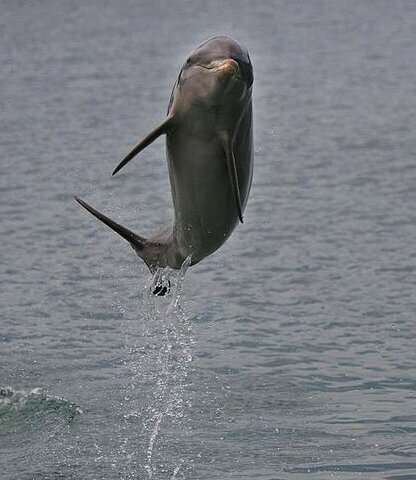How smart are dolphins? Credit: Wikimedia Commons: Stuart Burns
Imagine you are blindfolded and placed into a pool of water with a dolphin. The dolphin performs a movement, such as spinning in a circle, or swimming in a zig-zag pattern, and your task is to imitate this movement, without having seen it. Ready, go.
Sound impossible? While it may not be possible for a human to do this with any accuracy, a dolphin would have no problem at all. When cognitive psychologist and marine mammal scientist Kelly Jaakkola gave this task to the dolphins at the Dolphin Research Center in Florida, they had no problem at all copying a human's behavior. So how did they do it? Jaakkola thinks they used a combination of active listening and echolocation.
Humans love to claim the title of "smartest" living animal. But what does this mean? How do we define intelligence? With a person's GPA? Or SAT score? By assigning a person a number that places him or her somewhere on the scale from zero to Einstein?
Honestly, this is problematic. There are many different types of intelligence that we forget to consider. For example, Do you know that five is less than seven? Can you remember the location of an object when you can't see it? Can you mimic a behavior after watching it? Are you capable of cooperating to solve problems? Can you communicate effectively? All of these demonstrate different intelligent skills, many of which are observed in dolphins.
Needless to say, dolphins and humans are entirely different creatures. We have different body plans, different ways of interacting with the world, and different brains. It has been 90 million years since we shared a common ancestor, which is why the things we do have in common are so fascinating to researchers.
Like us, dolphins understand ordinality. When presented with two novel boards with different numbers of dots, dolphins at the Dolphin Research Center chose the smaller number 83 percent of the time. But unlike us, they weren't counting to solve this problem. When they were shown boards that represented consecutive numbers, the dolphins struggled, and often failed the task.
Similar to humans, dolphins understand that when objects are hidden from view, they still exist. At the Dolphin Research Center, they could easily remember the location of toy when a trainer hid it inside a bucket. However, unlike humans, dolphins couldn't infer the movement of hidden objects. If the bucket was moved, the dolphins didn't understand that the toy had moved with it.
While they may not be physicists, Jaakkola has shown that dolphins are stellar cooperators, and amazing at synchronous tasks. When asked to press an underwater button at the same time as a partner, the dolphins pushed their buttons within 0.37 milliseconds of each other, even when they started at different times. As the earlier example shows, dolphins can also imitate incredibly well, and this skill is not limited to mimicking members of their own species. Even though humans have an entirely different body plan, dolphins can flexibly use their flipper in place of a hand, or their tail in place of legs, and copy human movements.
It is believed that dolphins evolved their smarts so that they could navigate the complex social world that they live in. As the researchers at the Dolphin Research Center have shown, they possess a wide array of intelligent abilities, some similar to humans and others entirely different from our own. "Dolphins are not sea people," Jaakkola warned her audience, but that's not to discount the fact that they are brilliant in their own way.
More information: Kelly Jaakkola et al. Bottlenose dolphins can understand their partner's role in a cooperative task, Proceedings of the Royal Society B: Biological Sciences (2018). DOI: 10.1098/rspb.2018.0948
Journal information: Proceedings of the Royal Society B
Provided by Duke University























